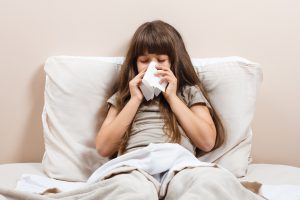
The researchers examined sleep duration, insomnia, and sleep hygiene in adolescents without asthma and with asthma to establish the effects of these factors on asthma control. The adolescents completed online surveys which the researchers then analyzed.
Sleep duration did not differ between the asthma group and non-asthma group, but asthma adolescents reported insufficient weekday sleep compared to the children without asthma (44 percent versus 31 percent, respectively). Asthma children also reported worsened sleep hygiene, and nearly double of asthma children reported insomnia, compared to children without asthma.
The researchers concluded that children with severe asthma experience insomnia, less sleep duration, and poorer sleep hygiene, when compared to children without asthma.
Asthma symptoms, nasal congestion as independent risk factors for insomnia
Both asthma and nasal congestion have been linked to insomnia. A study published in Asthma aimed to analyze the association between these conditions and insomnia to identify risk factors among asthma patients.
A postal questionnaire was sent out to over 45,000 Swedish residents with questions regarding insomnia, asthma, rhinitis, weight, height, tobacco use, and physical activity.
The study included 25,610 participants, and 1,830 patients were defined as asthmatics. Insomnia symptoms were significantly higher among asthmatics, compared to non-asthmatics. In those who reported asthma and nasal congestion, 55.8 percent had insomnia symptoms, compared to 35.3 percent in participants without asthma and nasal congestion. The risk of insomnia also increased as asthma symptoms worsened. Nasal congestion, obesity, tobacco use and smoking all increased risk of insomnia as well.
By better managing asthma symptoms and nasal congestion, a person can reduce their risk of insomnia. Lifestyle factors should be considered as risk factors and should be modified in order to reduce insomnia.
Related Reading:
Insomnia, depression and fatigue linked to frequent nightmares
A recent study found that insomnia, depression, and fatigue are linked to frequent nightmares. Lead author Nils Sandman said, “Our study shows a clear connection between well-being and nightmares.” Although the study did not prove that depression causes nightmares, it did reveal a close association between the two. Continue reading…
Asthma linked to lower brain cancer risk
Asthma and allergies have been linked to a lower brain cancer risk, according to latest findings. The research suggests that asthma sufferers, patients with eczema, and people with allergies are less likely to develop a type of brain cancer known as glioma brain cancer. Continue reading…
Sources:
http://onlinelibrary.wiley.com/doi/10.1111/all.12079/full
http://www.sciencedirect.com/science/article/pii/S2213219814000701